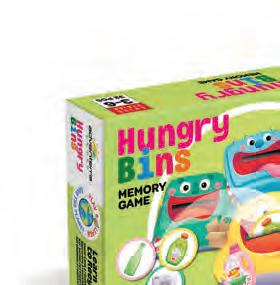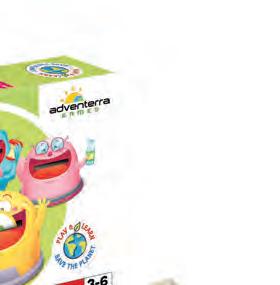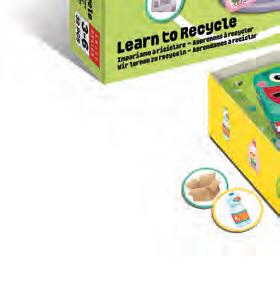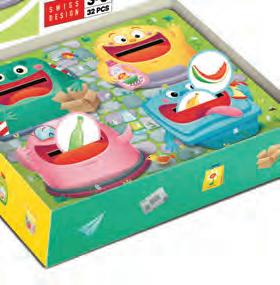
4 minute read
Ready, Set, Play
Learning from a 4-year-old about
DELAYED
Jean Bailey, Certified Play Expert Gratification
One of the participants’ favorite parts of ASTRA’s Certified Play Expert program is when they review the ground-breaking research conducted in the 1960s by Walter Mischel, a professor at Stanford. The research is commonly referred to as the ‘marshmallow test.’
Mischel developed this test to measure a particular attribute in preschoolers — delayed gratification. Mischel and his colleagues were curious about a subject each of us struggles with daily: self-control.
Ingeniously simple, Mischel and his team used a marshmallow as both a temptation and a reward. Four and fiveyear olds were seated alone in a room and given a simple proposition. The child was left alone with a single white, fluffy, sweet smelling marshmallow. They could choose to enjoy it right away or to wait a few minutes for the researcher to return. If the kids waited, they received double the reward with two marshmallows. young children’s dilemma because it is one we live with intimately. Chocolate chip cookie, anyone?
“Resisting temptation in favor of longterm goals is an essential component of social and cognitive development and of societal and economic gain,” a 2010 article on this research read in the Oxford Academic publication “Social Cognitive and Affective Neuroscience.”
When I was reviewing that research, I could not help but superimpose the experiment from the 1960s to the struggle society is having today, in 2020, dealing with a pandemic. kids how to regulate themselves. Play can provide kids the opportunity to develop
You cannot help but relate to those willpower, self-regulation, and self-control in exchange for a desired outcome, which
Play can be used as a vehicle to teach can be as simple as winning a game, making a goal, or finishing a puzzle.
What gives the marshmallow test so much relevance is that it evolved from a single research project into a four-decade life-span developmental study. Mischel continued to trace these children and correlated their original test to a pattern of outcomes as these preschoolers progressed from childhood to midlife.
“In follow-up studies, preschooler’s delay ability continued to predict later outcomes in adulthood including higher educational achievement, higher sense of self-worth, better ability to cope with stress,” the Oxford article read.
Mischel further enriched his findings by analyzing the successful strategies some kids used to receive the additional
marshmallow reward, and suggested that these can be employed by anyone hoping to increase their ability to delay gratification. These include:
Disengage
Kids who engaged their senses by smelling the marshmallow, feeling its soft texture, or lightly licking it for a hint of sweetness were far more likely to succumb to the temptation.
Distract
Preschoolers who forced themselves to refocus and instead sang, played with their toes, or even explored their nasal cavities (hey, no judgment here); were far more likely to end up with double the reward.
Daydream
A fascinating aspect of this research is that when kids were coached to think of a fun memory, they were able to wait ten times longer. It appears daydreams can save the day.
Translating to today, we as a society have been forced into our own test, and it too may be predictive of our future. We have had to coin our own phrases to deal with this situation such as: shelter in place, social distancing, and mandatory masks.
Many of us are sacrificing the sweet thrill of downing that one marshmallow by adopting behaviors that are new, taxing and take a great deal of self-control. Like the little kid alone with a marshmallow in a room, we are waiting…waiting to reconnect to friends and associates… waiting to get our customer base back… waiting to restore life as we once knew it.
“For me, the marshmallow test is not an indicator that our futures are already determined when we’re four years old, but that our potential for maximizing our lives involves a set of skills that are already visible and teachable at age four,” Mischel said. (It) involves a set of skills that can be taught and learned. They’re acquirable.”
Let’s learn from the successful four-year olds. When feeling overly challenged in our lives and businesses and wondering if it is worth it, we should disengage for a few minutes from the dilemma we see sitting squarely in front of us. Let us distract ourselves in a positive way. And by all means, daydream about a fun experience that brought you joy, success or fulfillment in the past.
Let’s choose to believe that someday, in the near future, whether in our homes, offices or stores, we’ll look up and find not one, but two bright marshmallows before us and realize the wait was truly worth it. ASTRA
Hungry Bins is an eco-friendly memory game for the whole family Cute cartoon bins introduce kids to recycling and composting Sustainably made, and so much fun to play and learn! Plus, 4 more preschool games & puzzles




Visit www.adventerragamesUSA.com to see our eco board games for Ages 7+ Contact us for 4th quarter specials: sales@adventerragamesUSA.com










